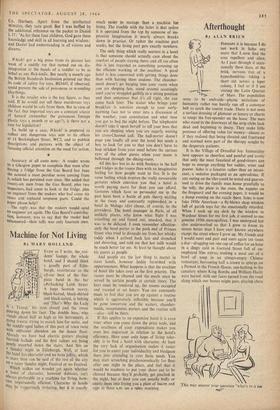Machine for Not Living
By MARY HOLLAND
EVEN as I write, the .resi- dents' lounge, the whole hotel, and I should think a goodly part of Edin-
• burgh, reverberate to the , all-out beat of the five- piece band in the bar t
4 overlooking Leith Street.
• A huge Scottish navvy, black-haired, black-shirted and black-suited, is belting . . out 'That's Why the Lady Is a Tramp,' his eyes Closed and the sweat Pouring down his face. The double bass, who stands about half as high as his instrument, is going frantic trying to match him for noise, and the middle-aged ladies of this part of town twist With oblivious abandon on the dance floor, Already we have had electric guitars playing Scottish ballads and the first sailors are being gently escorted down the stairs. And this on a Sunday night in Edinburgh. Well, at least the hotel has character and we have jollity, which is more than can be said of the rest of the city Oil a rainy Sunday night; Festival or no Festival.
Which makes me wonder yet again whether a hotel of character, however dubious, isn't always Preferable to a machine for living, how- ever impersonally, efficient. Character in hotels 'NY be ,;taggeringly irritating, but it is usually
much easier to manage than a machine for living. The trouble with the latter is that unless it is operated from the top by someone of im- pressive imagination it nearly always breaks down in practice. Or rather the machine part works, but the living part gets exactly nowhere.
The only thing which really matters in a hotel is that someone should actually care about the comfort of people staying there, and all too often this is just regarded as something jamming up the efficient working of the machine. A good hotel is less concerned with getting things done than with leaving them undone. The chamber- maid doesn't go barging into your room when you are sleeping late, stand around accusingly until you've struggled guiltily to a sitting position and then announce that it's all right, she can come back later. The waiter who brings your breakfast is sensitive enough to your early- morning face not to enter into a discussion of the weather, your constitution and what time you got to bed the night before. The telephonist doesn't take it upon herself to tell your boss that you are sleeping when you are eagerly waiting his cross-Channel call. The hall-porter doesn't page you loudly all over the hotel but sends a boy to look for you so that you don't have to leap stricken from your meal before the curious eyes of the other guests when your name is bellowed through the dining-room.
All this has less to do with flunkeys in the hall and fridges in the rooms than with an imaginative feeling for bow people want to live. It is the same feeling which inspires the really memorable gestures which convince you that a hotel is worth paying more for than you can afford. Gestures which have so persuaded me in the past have been a bottle of pale ..herry waiting in the room and constantly replenished in a hotel in Malaga (dirt cheap, of course, to the providers). The hotel manager in Paris, of all unlikely places, who knew what flight I was travelling on and found out, unasked, that it was to be delayed. I even remember affection- ately the head porter at the posh end of Princes Street who tried to dissuade me from hot whisky toddy when I arrived back late and drenched and shivering, and told me that hot milk would be much better for me. At least he thought about his guests as people.
And people are the last thing to matter in most hotels, however lushly furnished with appurtenances. What happens is that the machine of hotel life takes over as the first priority. The rooms must be cleaned and the meals must be served by certain people at certain times. The keys must be rendered up, the rooms occupied and vacated at set hours. You are constantly made to feel that you are up against a routine which is aggressively inflexible because you'll be gone tomorrow and the waiters, chamber- maids, receptionists, porters and the routine will --alas—still be there.
If this applies to an expensive hotel it is even truer when you come down the price scale, and the smallness of your expenditure makes you even less important in relation to the hotel's efficiency. Here your only hope of living toler- ably is to find a hotel with character. At least the very lack of organisation makes it easier for you to assert your individuality and bludgeon them into attending to your basic needs. You may start scratching psychosomatically for fleas after one night in the place, and feel that it would be madness to put your shoes out to be cleaned because they'll probably get pinched in the night, but at least you can usually bully or cajole them into frying you a plate of bacon and eggs at three a.m. on a rainy morning.


































 Previous page
Previous page